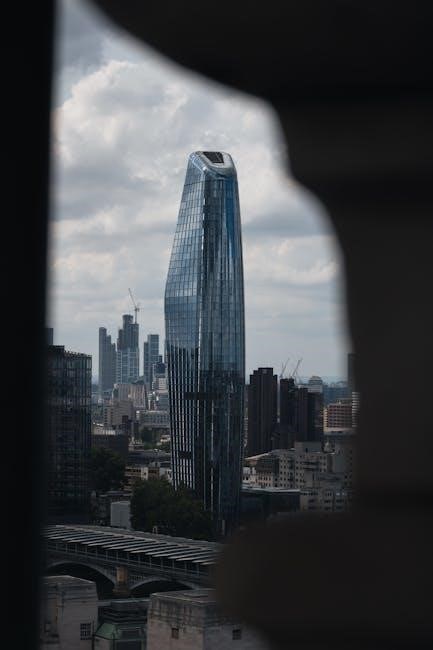The Sicilian Mafia, known as “Cosa Nostra,” is a powerful criminal organization rooted in Sicily, influencing both local and global affairs through its secretive operations and cultural significance.
1.1 Historical Background of the Sicilian Mafia
The Sicilian Mafia emerged in the mid-19th century amidst political turmoil and social instability in Sicily. Originating as a network of local protectors, it evolved into a powerful criminal organization. Initially seen as defenders of the poor, they later transitioned to illegal activities. The term “Mafia” was rarely spoken in Sicily, reflecting the secretive nature of this enduring criminal enterprise.
1.2 The Role of the Mafia in Sicilian Society
The Sicilian Mafia holds a complex role, blending intimidation with a perceived code of honor. Historically, they presented themselves as protectors, mediating disputes and offering stability in unstable times. This dual identity has shaped public perception, with some viewing them as Robin Hood figures while others see them as oppressors. Their influence permeates social, economic, and political spheres, creating a challenging dynamic within Sicilian communities.

Understanding the Concept of “Cosa Nostra”
“Cosa Nostra,” or “our thing,” refers to the Sicilian Mafia’s secretive operations and code of conduct. It embodies a criminal fraternity bound by loyalty, silence, and shared identity, shaping its enduring influence and mystique in both reality and popular culture.
2.1 The Meaning and Origin of “Cosa Nostra”
“Cosa Nostra,” meaning “our thing,” originated in Sicily, referring to the Mafia’s secret code of conduct. It emphasizes loyalty, silence, and brotherhood, defining the organization’s identity and operations. The term gained global recognition, symbolizing a criminal fraternity bound by shared values and rituals, with roots tracing back to the 19th century, evolving into a powerful and enduring symbol of organized crime.
2.2 The Structure and Hierarchy of the Sicilian Mafia
The Sicilian Mafia operates under a rigid hierarchical structure, with the “Capofamiglia” leading each local clan. Below him are “caporegime” overseeing crews, and “soldati” executing tasks. Loyalty and discipline are enforced through a clear chain of command, ensuring the organization’s cohesion and effectiveness in maintaining power and control within its territories and operations, both illegal and legitimate.
The Rise of the Sicilian Mafia
The Sicilian Mafia emerged as a dominant force in Sicily, evolving from humble origins to a powerful criminal organization. Its rise was fueled by strategic alliances, ruthless tactics, and the consolidation of power through control of territories and elimination of opposition, establishing it as a feared entity in both criminal and societal spheres.
3.1 Early Beginnings and the Evolution of Power
The Sicilian Mafia originated in 19th-century Sicily amidst social and economic turmoil. Initially, it emerged as a form of vigilante justice but quickly evolved into a sophisticated criminal network. By forging strategic alliances and eliminating rivals, the Mafia consolidated power, establishing a hierarchical structure that enabled control over territories and resources. This period marked the foundation of its enduring influence, blending covert operations with integration into legitimate societal structures.
3.2 Key Figures in the History of the Sicilian Mafia
Notable figures like Don Vito Corleone and Salvatore Riina shaped the Sicilian Mafia’s history. Don Vito, a fictional yet iconic character, epitomized the Mafia’s code of honor and strategic leadership. Salvatore Riina, a real-life boss, rose to power through ruthless tactics, orchestrating violent campaigns and dominating the organization during its peak. Their legacies highlight the Mafia’s evolution from secretive clans to a centralized power structure, marked by both cunning and brutality.
The Sicilian Mafia in Modern Times
The Sicilian Mafia remains a potent force, adapting to modern challenges while maintaining its grip on illegal activities and legitimate businesses, blending tradition with contemporary strategies.
4.1 Current Activities and Influence
The Sicilian Mafia continues to exert significant influence through drug trafficking, money laundering, and infiltration of legitimate businesses like construction and real estate. Its hierarchical structure remains intact, with bosses orchestrating operations from the shadows. The Mafia’s reach extends into politics and public contracts, leveraging intimidation and strategic violence to maintain control. Its adaptability to modern economic and technological changes ensures its enduring presence in both illegal and legal sectors, blending seamlessly into Sicilian society while perpetuating its legacy of power and fear, maintaining a dual existence of criminal enterprise and cultural phenomenon.
4.2 The Impact of Law Enforcement on the Mafia
Law enforcement efforts have significantly weakened the Sicilian Mafia’s grip, with major trials and convictions targeting high-ranking members. Anti-Mafia units and international cooperation have disrupted operations, seizing assets and undermining its financial base. Despite these successes, the Mafia adapts, evolving tactics to evade detection and maintain influence, highlighting the ongoing challenge of eradicating a deeply entrenched criminal network with extensive local and global connections.
The Cultural Significance of the Sicilian Mafia
The Sicilian Mafia has deeply influenced literature, film, and popular media, with its themes of power, loyalty, and crime captivating global audiences, shaping cultural perceptions of organized crime.
5.1 The Mafia in Literature and Film
The Sicilian Mafia has been a captivating subject in literature and cinema, with works like The Godfather and Mafia Romance showcasing its complex dynamics, cultural impact, and moral dilemmas. These narratives often explore themes of loyalty, power, and betrayal, reflecting the harsh realities of life under Mafia influence, as depicted in various books and films available online, including Venomous Gods and The Mafia and His Angel.
5.2 The Portrayal of the Mafia in Popular Media
Popular media often romanticizes the Sicilian Mafia, yet films like Mafia II and books such as Venomous Gods offer deeper insights into their operations and cultural impact. These portrayals highlight the Mafia’s influence on society, blending fiction with historical truths to captivate audiences while reflecting the complexities of their existence and legacy, as seen in various digital formats and narratives available online.
The Role of the Mafia in Italian Politics
The Sicilian Mafia has historically influenced Italian politics through covert ties and scandals, shaping governance while undermining public trust in institutions and transparency;
6.1 Historical Ties Between the Mafia and Politics
The Sicilian Mafia has long intertwined with Italian politics, providing support to politicians in exchange for protection and influence. This alliance allowed the Mafia to expand its power while politicians gained electoral support. Historical events reveal a symbiotic relationship, with Mafia figures often operating with impunity due to political collusion, embedding organized crime within the state’s fabric and perpetuating corruption.
6.2 Contemporary Relationships and Scandals
Despite increased law enforcement efforts, the Sicilian Mafia maintains discreet ties with modern politicians, often through indirect connections. Recent scandals highlight how Mafia-linked businesses infiltrate legitimate sectors, influencing political decisions and financial policies. These contemporary relationships underscore the Mafia’s adaptability in maintaining power, exploiting legal loopholes, and sustaining influence in both local and national Italian politics, perpetuating a cycle of corruption and control.

The Sicilian Mafia and Its Economic Empire
The Sicilian Mafia controls vast illegal activities like drug trafficking and extortion, while also infiltrating legitimate sectors such as construction and real estate, solidifying their economic influence.
7.1 Illegal Activities and Revenue Streams
The Sicilian Mafia generates substantial revenue through drug trafficking, extortion, and illegal gambling. These activities are central to their economic power, enabling them to maintain control and fund further operations while evading law enforcement. Their illegal ventures remain a critical component of their financial empire, ensuring continued influence in both criminal and legitimate sectors.
7.2 The Mafia’s Involvement in Legitimate Businesses
The Sicilian Mafia has diversified into legitimate enterprises, including real estate, construction, and hospitality. These ventures serve as fronts for money laundering and provide a veneer of legality. By investing in legitimate businesses, the Mafia integrates into the formal economy, gaining public acceptance while maintaining control over lucrative revenue streams that bolster their criminal operations.

The Sicilian Mafia and the Global Drug Trade
The Sicilian Mafia plays a pivotal role in the global drug trade, acting as intermediaries between South American cartels and European markets, facilitating the distribution of cocaine and heroin.
8.1 The Mafia’s Role in International Narcotics
The Sicilian Mafia acts as a key intermediary in global narcotics, connecting South American cocaine suppliers with European distributors. They control shipping routes, ensuring drugs reach lucrative markets while evading law enforcement through sophisticated networks and encrypted communications, maintaining their dominance in the international drug trade.
8.2 The Impact of the Drug Trade on Sicilian Communities
The drug trade has deeply affected Sicilian communities, fostering corruption and violence. It perpetuates economic inequality and social decay, undermining trust in institutions. Law enforcement efforts face challenges, leaving many citizens vulnerable to exploitation and fear, while the Mafia’s influence perpetuates a cycle of dependency and control.

The Sicilian Mafia and Organized Crime
The Sicilian Mafia is a cornerstone of organized crime, with a hierarchical structure enabling control over extensive illegal activities and infiltration into legitimate businesses, posing significant challenges to law enforcement and societal stability.
9.1 The Mafia’s Ties to Other Criminal Organizations
The Sicilian Mafia maintains strategic alliances with global criminal networks, collaborating in drug trafficking and money laundering. These partnerships enhance their operational reach and financial power, solidifying their influence in the underworld and complicating international efforts to dismantle their empire.
9.2 The Challenges of Combating Organized Crime
Combating the Sicilian Mafia is fraught with challenges, including their deep-rooted presence in communities, use of intimidation, and corrupting influence. Law enforcement faces difficulties in infiltrating their secretive networks and securing cooperation from witnesses. The Mafia’s adaptability and global connections further complicate efforts to dismantle their operations and disrupt their lucrative criminal enterprises effectively.

The Sicilian Mafia and Violence
The Sicilian Mafia employs violence as a tool for control, relying on planned killings and intimidation to maintain power and silence opposition, fueling fear and instability.
10.1 The Use of Violence as a Tool of Control
The Sicilian Mafia utilizes violence strategically to enforce obedience and maintain dominance. Through targeted assassinations, intimidation, and public displays of brutality, they create an atmosphere of fear, ensuring compliance within their territories. This methodical approach to violence solidifies their power and discourages opposition, embedding a culture of dread throughout Sicilian communities and beyond. The Mafia’s reliance on such tactics underscores their ruthless pursuit of control.
10.2 Notorious Crimes and Assassinations
The Sicilian Mafia has been linked to numerous infamous crimes, including high-profile assassinations of judges, politicians, and journalists. Notable cases like the murder of a police commissioner and the Via D’Amelio bombing highlight their brutal tactics. These acts not only eliminated opposition but also sent chilling messages to deter resistance. The Mafia’s willingness to target public figures underscores their brazen disregard for authority and their grip on power through fear and violence.

The Sicilian Mafia and the Law
The Sicilian Mafia has faced significant legal challenges, with major trials leading to high-profile convictions. Law enforcement efforts have targeted their hierarchical structure, aiming to dismantle their operations and reduce their influence through stricter regulations and international cooperation.
11.1 Major Trials and Convictions
Major trials against the Sicilian Mafia have significantly weakened its structure. Notable convictions include high-ranking members like Salvatore Riina and Bernardo Provenzano, whose arrests dismantled key hierarchies. These trials, often aided by informants, highlighted the Mafia’s internal codes and operational methods. Law enforcement’s use of wiretaps and testimonies from former members has been crucial in securing these convictions, marking a turning point in combating organized crime.
11.2 The Role of Informants and Witnesses
Informants and witnesses have played a pivotal role in dismantling the Sicilian Mafia. Their testimonies, often obtained through witness protection programs, have exposed internal hierarchies and operations. Notable figures like Salvatore Riina and Bernardo Provenzano were convicted with evidence from informants. These bravery acts, despite risks, have significantly weakened the Mafia’s grip, aiding law enforcement in securing high-profile convictions and disrupting criminal activities. Their contributions remain vital in combating organized crime.
The Sicilian Mafia in the Digital Age
The Sicilian Mafia has adapted to modern technology, utilizing encryption and online platforms to maintain secrecy and expand operations. This evolution reflects their resilience in a rapidly changing world.
12.1 The Mafia’s Adaptation to Modern Technology
The Sicilian Mafia has embraced modern technology to enhance its operations, utilizing encrypted communication tools and digital platforms for illegal activities. This adaptation ensures their survival in a tech-driven world, enabling them to remain elusive and maintain control over their criminal enterprises.
12.2 Cybercrime and the Mafia’s New Tactics
The Sicilian Mafia has diversified into cybercrime, employing tactics like hacking, phishing, and ransomware attacks. By leveraging dark web platforms and encrypted communication, they evade law enforcement. These digital strategies complement traditional operations, expanding their criminal reach while maintaining anonymity in an increasingly connected world.

The Sicilian Mafia and Society
The Sicilian Mafia deeply influences Sicilian society, maintaining power through fear and cultural narratives while being rarely openly acknowledged by locals in their daily lives.
13.1 Public Perception of the Mafia
Public perception of the Sicilian Mafia varies widely, ranging from fear to romanticization. Many Sicilians avoid openly discussing the Mafia, reflecting its pervasive yet secretive influence. Media portrayals often shape these views, with films and literature presenting the Mafia as both brutal criminals and intriguing figures. This duality highlights the complex societal role of the Mafia, blending intimidation with a misunderstood allure that captivates global audiences while haunting local communities.
13.2 The Mafia’s Influence on Local Communities
The Sicilian Mafia deeply impacts local communities, often controlling economic activities and social dynamics. Their presence can instill fear, yet some communities view them as providers of order or jobs. This paradoxical influence has historically allowed the Mafia to maintain power, blending coercion with cultural embeddedness. Their role in both disrupting and regulating local life underscores their complex and enduring presence in Sicilian society.
The Sicilian Mafia and the Global Community
The Sicilian Mafia’s influence extends beyond Sicily, impacting global markets through drug trafficking and illegal enterprises, while its secretive networks maintain a shadowy presence worldwide.
14.1 The Mafia’s International Reach
The Sicilian Mafia’s global influence spans across continents, with operations in drug trafficking, money laundering, and illegal activities. Their networks stretch into North America, South America, and Europe, facilitating lucrative criminal enterprises. This international reach allows them to maintain power and expand their economic empire, solidifying their presence as a transnational criminal organization. Their adaptability ensures continued dominance in the global underworld.
14.2 Global Efforts to Combat the Mafia
International collaboration and law enforcement efforts are crucial in combating the Sicilian Mafia. Agencies like Interpol and Europol coordinate cross-border operations to dismantle their networks. Strategies include targeting financial networks, disrupting drug trafficking, and extraditing high-profile members. Intelligence sharing and joint operations are essential in weakening their global grip, ensuring a unified front against their transnational criminal activities and ideologies.
The Sicilian Mafia’s legacy endures, shaped by its historical roots, cultural influence, and evolving strategies. Ongoing efforts to combat its reach continue to shape its future trajectory globally.
15.1 The Legacy of the Sicilian Mafia
The Sicilian Mafia’s legacy is marked by its profound impact on Sicilian culture, politics, and global organized crime. Originating as a secretive network, it evolved into a powerful force, influencing literature, film, and societal perceptions. Its historical ties to political corruption and economic control have left a lasting imprint, despite modern law enforcement efforts to dismantle its operations and reduce its influence.
15.2 The Future of the Sicilian Mafia
The Sicilian Mafia faces an uncertain future, with increasing law enforcement pressure and internal power struggles. While it adapts to modern challenges, its traditional influence wanes. Younger generations often reject its rigid codes, and global efforts to combat organized crime further erode its power. However, its resilience and ability to evolve suggest it may persist, albeit in a diminished form, in the shadows of Sicilian society.
